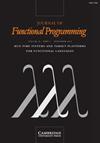契约透镜:通过计算对双向程序进行推理
IF 1.1
3区 计算机科学
Q4 COMPUTER SCIENCE, SOFTWARE ENGINEERING
引用次数: 0
摘要
双向转换(BXs)是一种保持相关数据的多个表示之间一致性的机制。透镜框架通常由透镜组合子构造BX,由于其模块化和构造正确性,已经成为BX编程的主流方法。然而,透镜的双向行为使得它们的方程推理和优化比单向编程要困难得多。我们提出了一种新的方法,通过程序计算从清晰的规范中推导出有效的透镜,这是一种通过代数定律来推理函数程序的正确构造方法。为了支持双向程序计算,我们提出了契约透镜,它用一对谓词扩展了传统透镜,以实现部分透镜的安全和模块化组成。我们定义了几个契约透镜组合子,捕获了常见的计算模式,包括$\textit{fold}, \textit{filter},\textit{map}$和$\textit{scan}$,并开发了几个双向计算定律来推理和优化契约透镜。我们用非平凡的例子证明了基于收缩透镜的新计算框架的有效性。本文章由计算机程序翻译,如有差异,请以英文原文为准。
Contract lenses: Reasoning about bidirectional programs via calculation
Abstract Bidirectional transformations (BXs) are a mechanism for maintaining consistency between multiple representations of related data. The lens framework, which usually constructs BXs from lens combinators, has become the mainstream approach to BX programming because of its modularity and correctness by construction. However, the involved bidirectional behaviors of lenses make the equational reasoning and optimization of them much harder than unidirectional programs. We propose a novel approach to deriving efficient lenses from clear specifications via program calculation, a correct-by-construction approach to reasoning about functional programs by algebraic laws. To support bidirectional program calculation, we propose contract lenses , which extend conventional lenses with a pair of predicates to enable safe and modular composition of partial lenses. We define several contract-lens combinators capturing common computation patterns including $\textit{fold}, \textit{filter},\textit{map}$ , and $\textit{scan}$ , and develop several bidirectional calculation laws to reason about and optimize contract lenses. We demonstrate the effectiveness of our new calculation framework based on contract lenses with nontrivial examples.
求助全文
通过发布文献求助,成功后即可免费获取论文全文。
去求助
来源期刊

Journal of Functional Programming
工程技术-计算机:软件工程
CiteScore
1.70
自引率
0.00%
发文量
9
审稿时长
>12 weeks
期刊介绍:
Journal of Functional Programming is the only journal devoted solely to the design, implementation, and application of functional programming languages, spanning the range from mathematical theory to industrial practice. Topics covered include functional languages and extensions, implementation techniques, reasoning and proof, program transformation and synthesis, type systems, type theory, language-based security, memory management, parallelism and applications. The journal is of interest to computer scientists, software engineers, programming language researchers and mathematicians interested in the logical foundations of programming.
 求助内容:
求助内容: 应助结果提醒方式:
应助结果提醒方式:


